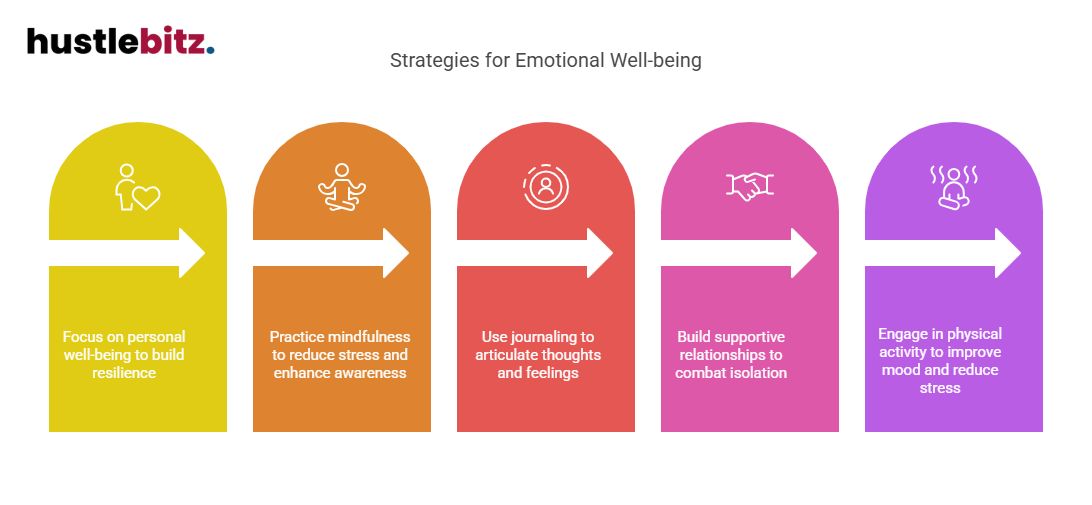Unlocking emotional healing through self-care practices is vital for fostering psychological well-being. Acknowledging unresolved feelings is essential for growth. Engaging in mindfulness techniques enhances resilience and promotes calmness, while self-compassion practices counter negative self-talk. Journaling can provide clarity and understanding of emotional triggers, facilitating deeper self-awareness. Incorporating physical activity not only elevates mood but also serves as an outlet for stress. Establishing a personalized relaxation routine tailored to individual needs creates a dedicated space for unwinding. These strategies collectively contribute to emotional healing, inviting a journey toward holistic wellness. Further insights await as you explore more effective self-care practices.
Key Takeaways
- Prioritize self-care routines to foster emotional resilience and maintain psychological well-being essential for effective healing and caregiving.
- Engage in mindfulness techniques to enhance emotional awareness, reduce stress, and promote a sense of calm in daily life.
- Incorporate journaling practices to articulate thoughts and feelings, thereby fostering self-awareness and clarity in emotional experiences.
- Establish supportive social connections to alleviate feelings of isolation and provide networks of encouragement for emotional healing.
- Embrace physical activity as an outlet for stress, enhancing mood through endorphin release and promoting overall emotional well-being.

Understanding Emotional Healing
Emotional healing is a vital process that involves acknowledging and addressing unresolved feelings to foster psychological well-being and resilience. For those committed to serving others, understanding emotional healing is essential, as it empowers individuals to support those navigating their own emotional landscapes. This process often encompasses trauma recovery, where individuals confront past experiences that have hindered their emotional growth.
To enhance emotional resilience, one can integrate mindfulness techniques into daily routines. Mindfulness encourages individuals to remain present, allowing them to observe their thoughts and feelings without judgment. This practice can serve as a powerful coping strategy, enabling individuals to manage stress and anxiety more effectively. By cultivating awareness, individuals can identify emotional triggers and develop healthier responses.
In addition to mindfulness, self-compassion practices play a crucial role in emotional healing. By fostering a kind and understanding inner dialogue, individuals can mitigate the effects of negative self-talk and promote a sense of worthiness. Self-compassion encourages individuals to treat themselves with the same kindness they would extend to a friend facing similar challenges.
Ultimately, understanding emotional healing requires a commitment to personal growth and the application of effective strategies. By embracing mindfulness techniques, coping strategies, and self-compassion practices, individuals not only enhance their own emotional well-being but also equip themselves to better serve others in their journeys toward healing and resilience.
The Importance of Self-Care
Prioritizing self-care is fundamental for maintaining emotional health and fostering resilience, as it allows individuals to recharge and address their own needs amid the demands of supporting others. The practice of self-care is not merely indulgent; it is an essential component of sustainable caregiving. By implementing self-compassion techniques, caregivers can cultivate a kinder internal dialogue, which is crucial in moments of stress and self-doubt.
Incorporating mindfulness exercises into daily routines helps to ground individuals in the present moment, offering a respite from the often overwhelming responsibilities of caring for others. These exercises can enhance emotional awareness and promote a sense of calm, allowing caregivers to navigate challenges with greater clarity.
Boundary setting is another vital aspect of self-care that ensures emotional well-being. By establishing clear limits, individuals can protect their energy and prioritize their own needs without guilt. This practice empowers caregivers to serve others more effectively, as it minimizes the risk of burnout.
Additionally, engaging in creative expression provides an outlet for emotions, facilitating healing and self-discovery. Whether through writing, art, or music, creative activities allow caregivers to process their feelings and reconnect with their inner selves.
Embracing holistic approaches to self-care ensures that emotional, physical, and spiritual needs are addressed. By recognizing the interconnectedness of these areas, caregivers can develop a well-rounded self-care routine that sustains their ability to care for others while nurturing their own emotional health.
Effects on Emotional Healing

Regularly engaging in self-care practices significantly impacts emotional healing by fostering resilience, enhancing self-awareness, and reducing stress levels.
These practices allow individuals to develop a deeper understanding of their emotions, unlocking self-awareness benefits that are crucial for personal growth and healing. As one becomes more attuned to their emotional landscape, they can identify triggers and patterns that may hinder their progress, paving the way for effective coping strategies.
Incorporating mindfulness techniques into daily routines can further bolster emotional resilience. Mindfulness encourages individuals to remain present and acknowledge their thoughts and feelings without judgment, which can diminish feelings of overwhelm and anxiety. This approach enables a clearer perspective on challenges and fosters a sense of control in emotionally turbulent situations.
Moreover, nurturing supportive relationships plays a vital role in emotional healing. Connecting with others who share similar experiences or who offer understanding can provide comfort and validation.
These interpersonal connections not only enhance emotional resilience but also serve as a foundation for developing healthy coping strategies. Engaging in open conversations and seeking support from friends, family, or community groups can significantly alleviate feelings of isolation.
Journaling for Emotional Clarity

Journaling serves as a powerful tool for achieving emotional clarity, allowing individuals to articulate their thoughts and feelings in a structured manner. Through reflective writing, individuals can explore their emotional triggers, gaining insight into the underlying causes of their feelings. This process not only fosters self-awareness but also encourages personal growth, making it an invaluable resource for those seeking to serve others through emotional understanding.
Utilizing journaling prompts can enhance this practice, providing direction and focus to the writing process. For example, prompts that encourage individuals to identify specific emotional triggers can lead to revelations about recurring patterns in their lives. By documenting these insights, individuals can better understand their emotional responses, paving the way for healthier coping mechanisms.
Incorporating daily gratitude into journaling practices further enriches emotional clarity. By taking a moment each day to acknowledge and reflect on positive experiences, individuals can shift their focus from distressing emotions to uplifting moments, promoting a more balanced emotional state. This practice aligns seamlessly with mindfulness techniques, which encourage individuals to remain present and connected with their feelings.
Ultimately, journaling not only serves as a means of self-exploration but also equips individuals with the tools necessary to support others. By fostering emotional clarity, individuals can build empathy and compassion, thereby enhancing their ability to serve their communities effectively. Embracing journaling as a self-care practice will undoubtedly lead to profound emotional healing and deeper connections with oneself and others.
Physical Activity and Its Benefits

Engaging in physical activity not only complements the emotional clarity achieved through journaling but also plays a significant role in promoting overall emotional healing and well-being. The mind-body connection is a crucial aspect of this process, as physical movement fosters a deeper awareness of one’s emotions and promotes resilience in the face of life’s challenges.
Regular exercise can lead to mood elevation, largely due to the release of endorphins, which are natural mood lifters. Incorporating a variety of exercises—such as yoga, walking, dancing, or team sports—can enhance the healing experience by preventing monotony and engaging different muscle groups, thereby keeping the body and mind invigorated. This exercise variety also encourages individuals to explore activities that resonate with them personally, creating a deeper connection to their physical selves.
Moreover, physical activity plays a vital role in stress reduction. Engaging in movement allows individuals to release pent-up tension, providing a healthy outlet for stress and anxiety. Furthermore, many forms of exercise offer opportunities for social interaction, whether through group classes or organized sports, which can foster a sense of community and support. Such connections can be invaluable for those on a healing journey, as they provide a network of encouragement and understanding.
Creating a Relaxation Routine

Establishing a personalized relaxation routine is essential for fostering emotional healing, as it creates a dedicated space for individuals to unwind and reconnect with their inner selves. Such a routine can be tailored to individual preferences, encompassing various techniques that promote serenity and mindfulness.
Incorporating mindful breathing into your routine serves as a powerful tool for centering oneself. By focusing on the breath, individuals can cultivate awareness and reduce stress. Complementing this practice with sensory immersion—engaging all five senses—enhances the relaxation experience. For instance, listening to calming music or using soft textures can ground the individual in the present moment.
Nature walks provide another enriching element to a relaxation routine. Immersing oneself in nature not only fosters a sense of peace but also connects individuals with the healing properties of the natural world. Pairing these walks with guided imagery techniques can amplify the benefits, allowing individuals to visualize serene landscapes or comforting experiences that promote inner calm.
Aromatherapy techniques, such as diffusing essential oils or using scented candles, can further enhance relaxation. The scents of lavender or chamomile, for example, are known for their soothing qualities and can create an inviting atmosphere conducive to emotional healing.
Final Thoughts
Unlocking emotional healing through self-care is an essential practice for anyone seeking personal growth and well-being. By integrating mindfulness, journaling, physical activity, and relaxation techniques into your daily routine, you create a foundation for emotional resilience and self-awareness. These practices not only help manage stress and emotional challenges but also enhance your ability to support others. Through consistent self-care, you can foster a deeper connection with yourself, promote healing, and lead a more balanced, fulfilling life. By prioritizing your emotional health, you open the door to holistic wellness and personal empowerment.




